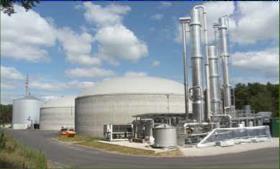
Longevity, a high degree of automation, low operating and maintenance costs, and the resulting cost efficiency were a central goal during design. A plant layout was developed which optimally accounts for the process’ biological demands, as well as permits and legal framework. Photo credit: Greenline.
German-based Greenline is planning a 3 MW biogas plant expansion after the successful trial of an industrial-scale biogas plant in Brandenburg. The biogas plant uses a substrate mix of sugar beet, grass silage and maize to produce energy. The plant was designed by Greenline and is operated by Biogas Osters & Voß GmbH & Co. KG from Groß Gottschow.
At full production, the plant ferments nearly 56,000 tons of corn, grass silage and sugar beets into twelve million standard cubic meters of biogas. The plant consists of steel-enamel elevated tanks for fermentation combined with concrete tanks for post fermentation and slurry storage. Unlike traditional biogas technology, this plant features elevated fermentation tanks allowing for less energy consumption compliments of gravitation. The plant also features a central stirring system that Greenline says enables difficult substrates to be economically processed. And with the concrete tanks serving double duty, additional cost efficiencies are achieved.
Other features of the biogas plant include a concrete bunker silo that stores nearly 30,000 tons of substrate with vertical walls with U-partitions used for compartment separation. The beet storage chambers features asphalt used as an acid-resistant coating. Beets are fed through an acid resistant stainless steel screw hopper while the corn and grass silage is feed through a solid compact container. The resulting biogas is the converted to standard gas by a combined organic and non-organic wet process, and then fed to the regional gas network belonging to HanseWerk AG (formerly E-On Hanse).
All together, Greenline says, the biogas plant design offers longevity, a high degree of automation, low operating and maintenance costs all leading to cost-efficient biogas production.

